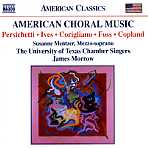Even 40 or so years after it was written, Charles Ives’ Psalm 90 still seemed radically, ingeniously cool to a certain familiar bunch of ’60s-era college choir singers–and it still maintains the aura of its composer’s special, inimitable musical sensibility that defies placement in any age or style. The University of Texas Chamber Singers, a first-rate choral ensemble with an impressive resumé that includes world-premieres and prestigious appearances both here and internationally, sings this and the rest of the program with the confidence, technique, and straightforward stylistic awareness required to show the distinct character and particularly engaging musical aspects of each work.
Some of these pieces remain more appealing today than others: John Corigliano’s Fern Hill, for example, a masterful choral conceptualization of Dylan Thomas’ poem that in style and mood recalls what Samuel Barber did with solo voice in his Knoxville: Summer of 1915, wears its nearly 50 years far better than Persichetti’s Flower Songs do their 25. The reason: Corigliano’s wedding of music and poetry seems to be the result of poetry informing musical style, while Persichetti’s e.e. cummings settings are more about music than text. And although the music is certainly expertly crafted and beautifully scored (there are many very nice choral moments), the angular melodies and often ambiguous harmonic context eventually tires the ear and sets your attention adrift. Both the Foss and Copland works are very much of their time–the Foss typically frothy and overwrought, the Copland skillfully constructed but quaint in its harmonic/melodic ideas and structural technique.
Nevertheless, these are all excellent examples of these composers’ choral writing, showing both the diversity and similarity of styles (particularly regarding rhythm and harmony) in the way they set poetic English texts. And thanks to James Morrow and his fine choir, we get to hear them performed to an exceptionally high standard. There are times when I wished for clearer diction (especially since, most unfortunately, no texts are provided!), slightly more precise word or phrase endings, and more consistent balances between orchestra and voices. But this really is very good singing and playing of works we rarely hear these days–a welcome and highly recommended collection! [6/14/2007]
































